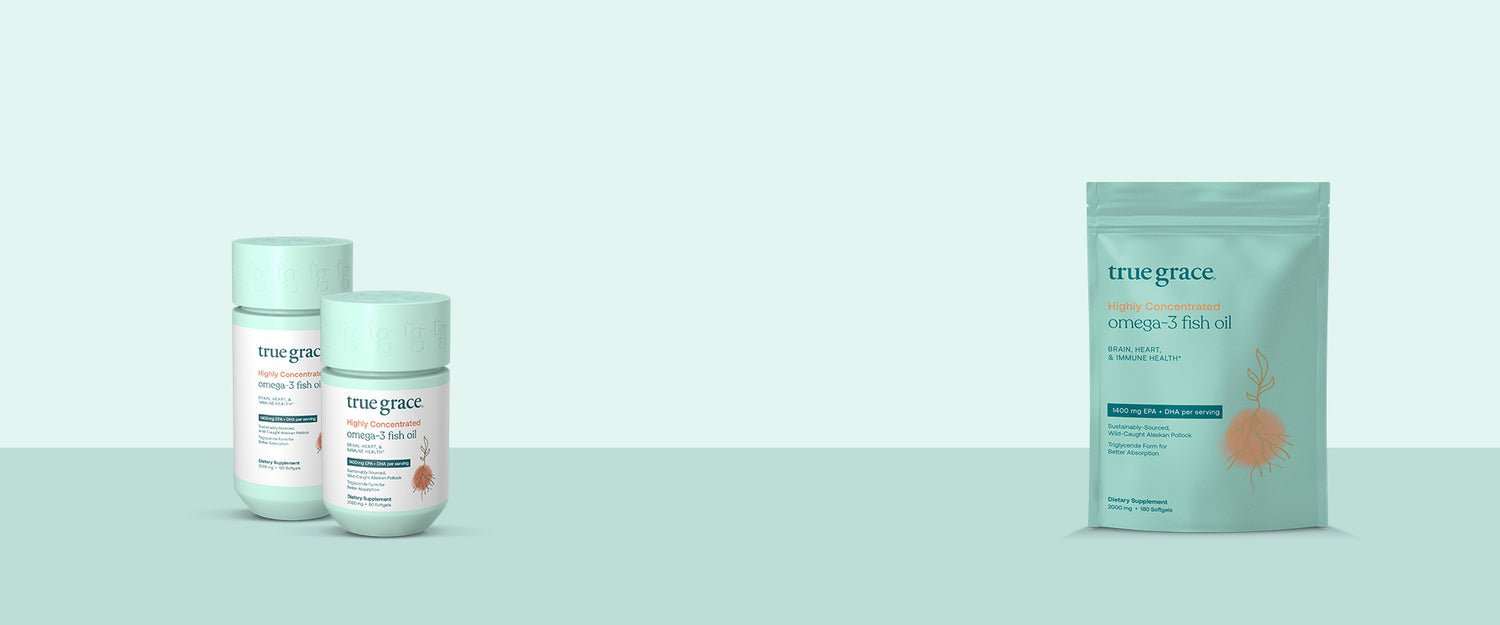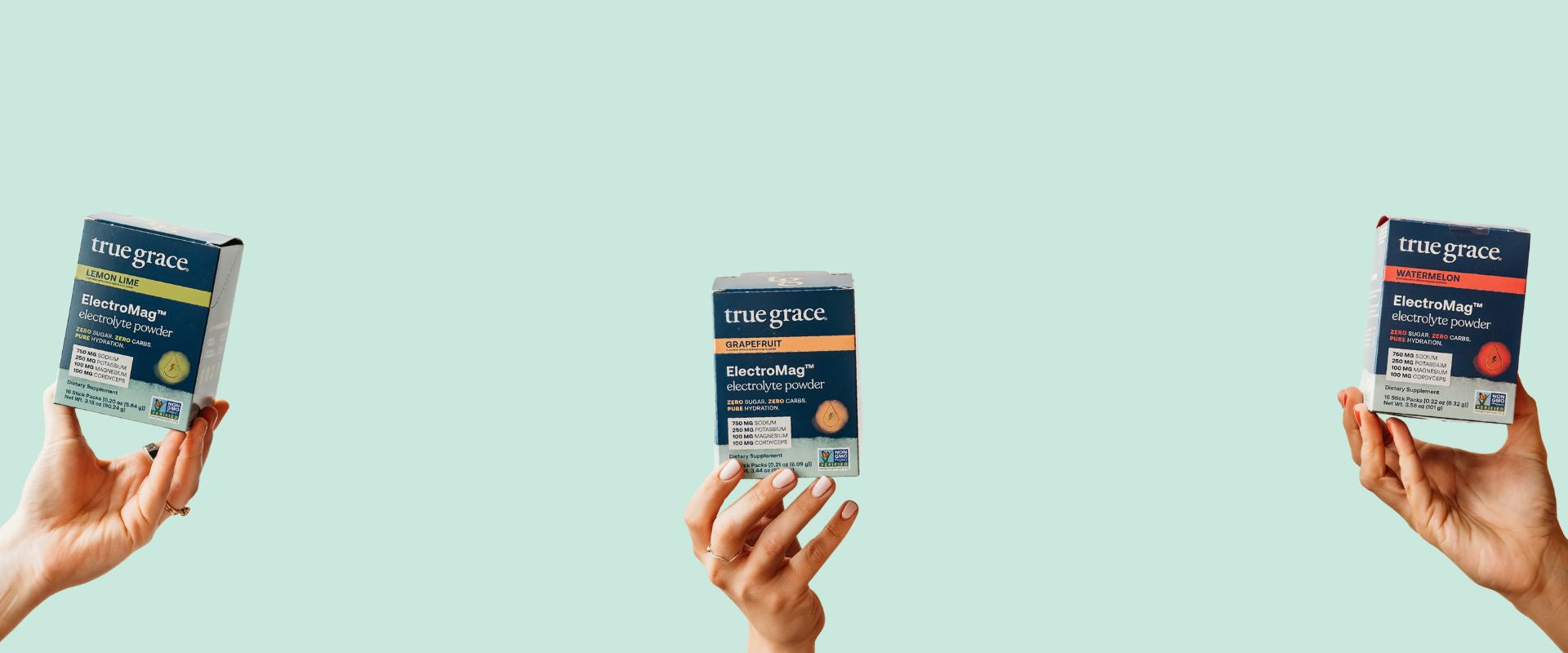Not all omega oils are created equal.
“Aren’t all omega-3 supplements just fish oil? How different could they be?”
If you’ve ever wondered this—or had a skeptical friend pose the question—buckle up. As is so often the case in the world of nutrition, there’s a lot to learn. (And trust us: It’s fascinating stuff.)
First things first: What’s in omega-3 supplements?
It’s true that the majority of omega-3 supplements are sourced from fish. And these supplements all contain two types of long-chain polyunsaturated fatty acids (a fancy way of saying “healthy fats”). Those two healthy fats are the omega-3s EPA and DHA: eicosapentaenoic acid and docosahexaenoic acid (again: fancy-sounding).
EPA and DHA have been shown to support brain, heart, and immune health and may support joint health too.
How strong is the evidence for these omega-3s’ benefits? More than 36,000 studies—including nearly 4,000 human clinical trials—have been published on EPA and DHA, with 80 percent of this research finding benefits to consuming these omega-3s.
So what makes one omega-3 supplement different from another?
1. Concentration
Some omega-3 supplements offer much more EPA and DHA per serving than others. Plus, the labeling can be confusing. For example, a supplement may boast 1,000 mg of fish oil, but the actual quantities of DHA and EPA may be much lower than that. At True Grace, we guarantee you 1,400 mg of EPA and DHA in every serving of our Highly Concentrated Omega-3 Fish Oil, and we’re clear about that on our label.
2. Bioavailability
You’ve probably heard the word “bioavailability” bandied about recently. It refers to nutrient absorption—specifically, how well a supplement is absorbed into your body so that it’s able to have a clinical effect. Bioavailability is a big deal. After all, you can faithfully consume a supplement that offers a clinically significant dose of the active ingredient, but if your body can’t absorb enough of the ingredient, you won’t see the benefits.
To understand why some omega-3 supplements are more bioavailable than others, you need to dig into a little chemistry (but not too much—we promise).
There are two main forms of omega-3 supplements on the market: ethyl esters and triglycerides. They have different chemical structures. Ethyl esters consist of EPA and DHA attached to an ethanol (alcohol) “backbone”—a chemical structure that was dreamed up in a lab. Triglycerides consist of EPA and DHA attached to a glycerol backbone. This is a chemical structure your body readily recognizes. Why? It’s the same structure as nearly every naturally occurring fat you consume, whether from nuts or from fish.
Your body treats each form differently. Ethyl esters are broken down and absorbed into your bloodstream more slowly, mainly because the ethanol “backbone” must be separated from the EPA and DHA and replaced with a glycerol backbone before your body can use them. (Your body can swap in the necessary glycerol by pulling it from other fats you eat.) Triglycerides are broken down and absorbed more quickly. Your body is very good at digesting triglycerides—it’s had a lot of practice. Plus, the triglyceride form already contains the necessary glycerol.
Not surprisingly, research shows you’ll likely absorb more of the triglyceride form overall, meaning it has greater bioavailability1—and greater potential to benefit your health. Our Highly Concentrated Omega-3 Fish Oil contains only the true triglyceride form. It’s more labor-intensive and expensive to produce than the ethyl ester form, but knowing that you’ll get more from it makes it worth it for us.
The other issue that often comes up when discussing absorption of fish oil is this: “What about toxins? Doesn’t greater bioavailability mean I’m also absorbing a high amount of toxins that bioaccumulate in fish, like mercury and PCBs?” Our Highly Concentrated Omega-3 Fish Oil passes rigorous testing for these and other toxins, so you can rest assured that you’re simply absorbing high levels of EPA and DHA—not toxins.
3. Sourcing
As with all things fish—from which sushi you order at a restaurant to what you buy at the fishmonger—sustainable sourcing matters.
Some omega-3 supplements are sourced from overfished fisheries, depriving other sea life of the food they rely on and putting the ocean’s health in peril. Once the oil has been pressed out of these fish, they’re ground up and used as fertilizer or fed to other animals—sometimes even to farmed fish.
But at True Grace, we source our fish oil from wild-caught Alaskan Pollock that come from Bering Sea-based fisheries with a proven record of sustainable management. The bycatch rate (the amount of sea life that’s not Alaskan Pollock that’s caught during fishing operations) is less than 1 percent, and no bottom-trawling is ever used.
These Alaskan Pollock then go to a family-owned and -operated refinery in the USA, where they become the AlaskOmega® triglyceride fish oil concentrate we use in our supplements (for all the reasons listed above). Our Highly Concentrated Omega-3 Fish Oil is even traceable back to the specific fishery it came from, so you can check that it meets strict standards for sustainability, including its impact on wild fish populations and their ecosystems.
The choice is yours
Ready to make the switch to an omega-3 supplement that’s highly concentrated, bioavailable, and truly sustainable? Because all omega oils aren’t the same—and your choice has the potential to change your health and that of the ocean.*
1.Bioavailability of marine n-3 fatty acid formulations - PubMed (nih.gov)




